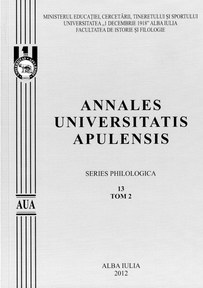Tudor Arghezi şi relevanţa actuală a unei pedagogii implicite a cremaţiunii
Tudor Arghezi and the actual relevance of an implicit pedagogy of cremation
Author(s): Adriana TeodorescuSubject(s): Literary Texts
Published by: Universitatea »1 Decembrie 1918« Alba Iulia
Keywords: Arghezi; cremation; pedagogy; imaginary; criticism; thanatology
Summary/Abstract: One may say that about Tudor Arghezi – Romanian complex writer, first hand innovator of poetic language through the adhesion to Baudelaire’s aesthetics of the ugly and through its refinement in modernistic key, author of prose and literature for children, inconvenient journalist – everything has been already said. If this fact is not true for the reader, whose reading act may be free, it may be true at least for the researcher, who feels oppressed by the object of research Tudor Arghezi, wrapped in previous studies and researches on him. This first discouraging impression is, in fact, a difficult effect to prevent of a writer’s canonization. Our paper has the goal of emphasizing an implicit pedagogy of cremation present in Tudor Arghezi’s work and unveiling its significances for the nowadays context of cremation in Romania. It is the case of a context, characterized by the rejection tendency of cremation as a funeral complementary practice to interment and blaming the adepts through mass-media, Romanian Orthodox Church and public opinion. The secondary objectives are, on the other hand, refreshing the object of research Tudor Arghezi by placing the author in the cultural history of cremation, hypostasis of the history of death and dying, and, on the other hand, shaping a method of approach on cremation that would function as an alternative for the other options and that could be used nowadays, with real benefits for the individual’s freedom of thinking. Using literary analysis, as well as interdisciplinary theories and methods of investigating thanatology, we notice three major semantic-functional areas of the Arghezi’s pedagogy of cremation. On the cultural area we point out the writer’s criticism on entombment and cremation, and their deconstruction of the natural and/or sacred character. The comprehensive area refers to Arghezi’s attempt of assimilation and shaping a paradigm of cremation on a level of imaginary, having the result of softening the idea of cremation. We may highlight the fact that on the poetic area the cremation paradigm contributes to creating new poetic formulas of high originality with a double result: dismantling some stereotypes concerning cremation and modelling a potential of poeticity of the cremation paradigm.
Journal: Annales Universitatis Apulensis. Series Philologica
- Issue Year: 13/2012
- Issue No: 4
- Page Range: 225-250
- Page Count: 26
- Language: Romanian

